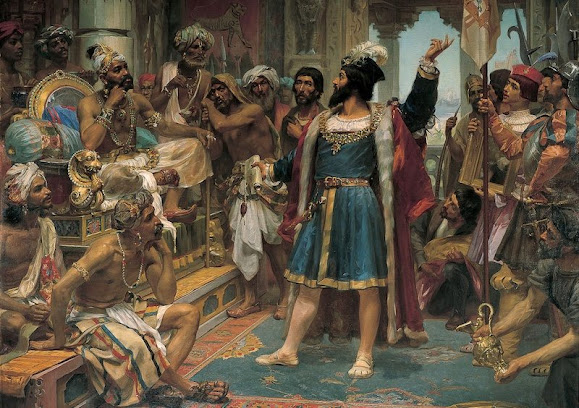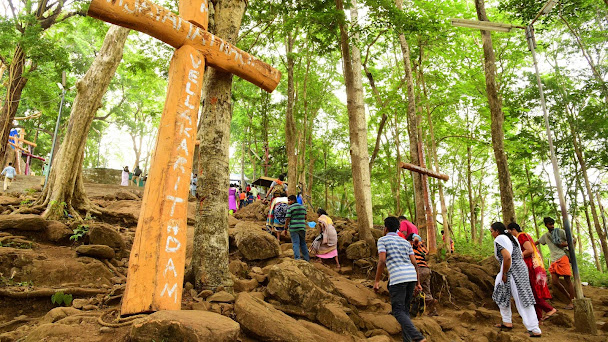The arrival of Vasco Da Gama
On the side of the road along the Kappad
Beach n Kozhikode one can find a stone memorial with an inscription which
remembers the date when Vasco Da Gama landed
at Kappad. The memorial is appropriate to have in Calicut as the epoch of Gama
is an important milestone in the history of Calicut. Gama is credited to have
found the route to India when he landed in Kappad but this belief is not true
to a certain extent. Even before Gama landed at Kappad, Calicut had trade
relations with the Chinese & the Arabs. The arrival of Vasco Da Gama only
resulted in the start of relations with Europe & for that unknowingly Gama
is responsible. In truth, there is nothing in Vasco Da Gama’s discovery which
entitles him to the claim of a great explorer. His glory is entirely based on
the historical events that followed his arrival & many years past his
death.
Vasco Da
Gama did not reach the coast of Kerala accidentally or sailed in unchartered
waters. On the contrary he was helped by very competent Indian pilots supplied
to him by the African kings as he turned under the African Peninsula now called
Cape of Good hope. It is also said that Gama in his ship had the assistance of
a Portuguese speaking Arabic sailor who was given to him by the Sultan of
Melinda in East Africa.
Vasco Da
Gama arrived at the coast of Kappad or Kappakadavu on 20th May 1498 with
his three ships - St Raphael, St Gabriel & St Miguel. The Portuguese ruler
Dom Manual had asked Vasco Da Gama to start this journey from Lisbon to the
east in search of new trade routes. The Chinese travellers had mentioned to the
King regarding big fortunes from the east which were mainly accessed only by
the Arabs. Though the actual number of ships & men given to Gama for the
expedition is still not clear, one can know that Gama and his crew faced quite
a lot of hardships on the rough seas & they lost a lot of ships & men
during the expedition. They reached the coast with 3 huge ships & it would
indeed have been a great sight for the local fishermen to find the ships along
the sea which looked different than the ones they were used to seeing in the
open seas. The sight would also be odd in terms of the period of time they
arrived which was unusual for traders as it was the time of rough seas. They
also looked different in complexion, attire & language from the Arabs who
frequented the shores for trade. It is said that Gama planned to dock at the
port of Kodungallur but found his way to Kappad.
The
arrival of Vasco Da Gama cannot be described as a wise moment in history as
Gama was never a great diplomat or trader. His primary objective in landing at
Calicut was to oust the Arabs from trading & form a monopoly. The Zamorins
on the other hand were always courteous to any person who came to the shores
& the same gesture was extended to the new guest. As the arrival of
Portuguese was not informed to the Zamorin ruler in advance, he was not in
Calicut at the time of Vasco Da Gama’s arrival. He was in Ponnani which was the
second capital of Zamorins. Upon receiving the news about Gama’s arrival the
king ordered his men & navy to make proper arrangements to receive &
accommodate the newcomers. In the chronicles of the Portuguese companions of
Gama one can find the description of how they were welcomed by the Zamorins
& the people of Calicut. They were taken in a grand procession on land
& along the canals to Calicut. As all before them, it was a ritual to take
the new traders to the Bhagavathy temple for blessings & the same was
followed with Gama & his companions. Gama who did not know whether any
other religion existed other than Christianity mistook the temple for the church
of Virgin Mary. This event is well documented in the chronicles of Portuguese
in which the General & attendants bent upon their knees to say prayers
while the local people practised dandanamaskaram which made the
foreigners realise that this was not the Virgin Mary they were praying to. The
temple as per the legend seems to be the Puthur Bhagavathy temple in
Puthiyangadi. The procession was so grand that the whole group was led by
trumpets & gunshots at intervals. They were accompanied by around 3000 armed
Nayars who were the military of Zamorins. It is said that the General
was so proud of the reception that he wished the same would be given to him on
his return to Portugal. As they approached the palace, they were escorted
inside by the Thalappana Namboothiri who was the chief Brahmin in the palace
& they stood inside the hall of audience. The opulence of wealth inside the
palace, men wearing Gold or Silver ornaments impressed Gama. The king was lying
on a couch & he gestured to Gama to take a seat next to him.
Da Gama
had interpreters who knew both local dialect & Portuguese so there were no
language barriers in communication. Gama handed Zamorin the letter from his
king requesting for a treaty of friendship & commerce. The Marakkars were
suspicious of the Portuguese; so were the Mappilas who were Arabs & they
sensed a certain rivalry with the Portuguese in terms of trade on the open
seas. The General too was a bit suspicious of Mappilas & asked the Zamorins
for separate lodgings for his people which the ruler accepted. The gifts given
to the Zamorins by Gama included scarlet cloth, hats, corals, brass vessels,
sugar, oil & cask of honey. The absence of Gold & precious stones was
strange & this made everyone convince the Zamorin that the newcomer is no
trader but a pirate at sea. The King still provided the newcomer spices in
trade for his gifts. When Gama was returning back to Lisbon, it was mandatory
for any person who came to the shores for trade to give duties to the ruler,
this did not go well with Gama who rejected this policy. The Nayars detained
some of his agents as security which enraged Gama. They were later released but
an angry Gama left in a haste carrying goods. He also by force took few Nayars
& some fishermen on his way back to Lisbon. Upon arrival in Lisbon he was
given a hero's welcome & the King showered a lot of praises at his ability
to undertake such an expedition. The king wrote a decree which awarded Gama
& his family a pension for life. Gama’s expedition opened the way for trade
with India & brought commercial gains to all of Europe. It is believed that
the goods brought back from the first voyage by Gama was sixty times the cost
of the expedition.
Gama
after a short period went on his next voyage to India, actually Vasco Da Gama
came to the shores of India three times in his lifetime, second time he was
instrumental in starting a century-long dispute with the Zamorins & Arabs.
The last time his voyage ended in his death at Kochi in 1524. His body was
buried in the church of St Francis at Kochi for a long time, until they were
moved to Portugal.
The
Kappad beach today is a place to remember the exploits of Vasco Da Gama. His
legacy may not bring good memories for many but Vasco Da Gama is one person who
got Calicut on the world map for future nations to come to the shores of India.




Comments
Post a Comment